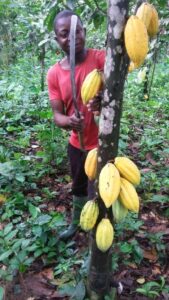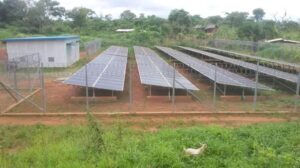Ngoke II is one of the villages in Mbangassina Sub Division in the Mbam and Kim Division of the central region.
Ngoke II is about 30 km away from Yaounde.
Ngoke II is a locality with close to 10.000 inhabitants made up principally of the “Bababutus” being the sons and daughters of the land.
Ngoke II is borded by villages like Tarba, Teake, Ngoke I, Mvoundo and others.
Majority of stranger-population in Ngoke II are Anglophones most of whom have fled from the crisis in the North West and South West regions.
The main Activity in the village is farming.
The soil and the climate of the area is good for the production of food and cash crops such as plantains, cocoyams, yams, cassava, maize, with cocoa which is the main source of income to the people.

Cocoa in Ngoke II is harvested twice a year ie between June/July and then in October/November.
Most of the people in this area especially the men consume alot on alcohol (hot drinks in sachets) which they believe it give them more energy to go about their activities(farming).
Timber exploitation mainly for export is another common activity in the Mbangassina Sub Division.
The area has few public infrastructure like primary and secondary schools, health center and gendams posts.
The challenges faced by the people of Ngoke II and other neighboring villages are;
-Poor road network. With the construction of the Mbangassina bridge over River Sanaga, they thought the construction of the road will immediately followed. But it’s 7 years today since the bridge was completed.
“Despite Timber exploitation and cocoa production here, the place still remains under developed because the resources only leave and nothing is done to reinvest after transformation” an indigen told News Upfront reporters.
Electricity is another major challenge in the areas.
Electricity is yet to be distributed in the area.
Solar energy is the main source of electricity in the village.

Even though there are solar panels that supplies light, the people are not satisfied because supply is not constant owing to the different seasons.
“In days of bad weather, we will have no light” a villager laments.
More so, activities like weldering and a lot others cannot support the solar energy because of low power.
The people are therefore pleading on the government and the powers that be to come to their assistance.
By Jeremi Romi in Ngoke II (Journalism Intern)








